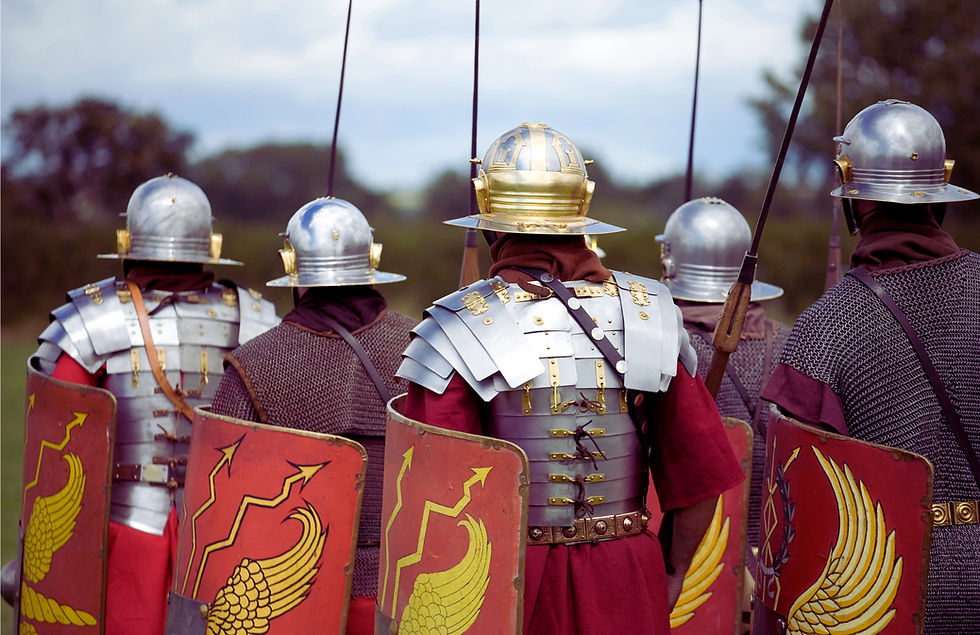WHY HISTORY? WHY ROME?
- James Cullen
- Jun 10, 2025
- 3 min read
History is perhaps something that many people don't give much thought to. This might be due to the way it's taught to us, or maybe we take it for granted? After all, history is just a list of important names and dates isn't it? Facts and numbers to be remembered so you can get good marks on your exam, and then forgotten soon afterwards.
My interest in history is almost as old as I am. I don't remember exactly when it developed. There's no clear moment or beginning to the story. I just exist now as a 30 something year old father of two, who spends a lot of time thinking about the past.

Almost as strong as my passion for learning about history is my desire to tell people about it, which is how the idea of Kids Roman Army was born. I like to think about things, and putting yourself in the shoes of people in history is one of the big challenges about the topic. If you take it beyond the names and the dates, the significant events and the cataclysmic tragedies, history is just the story of humanity, regular people living their lives, largely invisible from the historical record.
It's this concept that drew me to Ancient Rome, wanting to know more about the every day experience. We all learn about Rome in primary school history, and particularly in Britain, we take the Romans for granted. They came, they saw, they conquered, and then they left...nearly 2000 years ago, so why are they relevant today?
When I was in primary school, a history workshop came round the school, with someone dressed as a Roman soldier, and I was captivated. I don't remember the rest of that school day, or even many details other than "Wow! A Roman soldier in my school!", but the seed was planted, and has grown over the intervening decades into a lifelong passion for learning about the past.
Something about that person dressed in the armour stuck with me, and it forms the basis of our philosophy here at Kids Roman Army. Yes, when we learn about the Romans we have to know who Caesar was, what the Colosseum was for, what numbers are represented by X V or II, and how the Romans ruled Britain a long time ago. But most of what we know about the Romans comes from written sources, and most of these written sources were compiled by members of the populace that we may today call "The 1%". The remainder of the population of the Roman Empire are largely invisible from the written record, except when we find small snippets of letters, or gravestone inscriptions. But the fact of the matter is, most of us alive today share more in common with the every day folks of the past than we do with the upper echelons of Roman society. So while reading Suetonius, Tacitus or the letters or Cicero are very interesting, these were members of the upper classes, in positions of incredible privilege. We are more interested in exploring the daily life of the vast majority of the people living in the past, in as much detail as we are able to.
Once I got involved in historical re-enactment (which I'm still convinced is just adults giving a more serious sounding name to "playing dress up with swords") I learned more from putting on a suit of Roman armour than from all of the reading of books, watching of Documentaries and movies, and visiting museums combined. I got to feel the weight of the kit, the cumbersome marching pack and the heavy shield, I quite literally put myself in the boots of a Roman soldier.
And that is what we want to do; our aim isn't to come into a school and stand in front of the class in costume and talk them through a very long and detailed timeline of everything relating to the Romans and their time in Britain. It is to get the kids on their feet, kit them out with a shield, get them marching, following orders, forming up and defending against (very soft and safe) missile bombardments!
They can feel how heavy a suit of Roman Armour is, and we even have a kid sized one for those brave enough to put it on. We want to give a memorable experience with tangible things to do, explore and feel.
Our hope is that this immersive experience gives a depth of context to their curriculum learning that reading a book or even watching a film simply can't do. And if it doesn't, at least they've (hopefully) had fun!



Comments